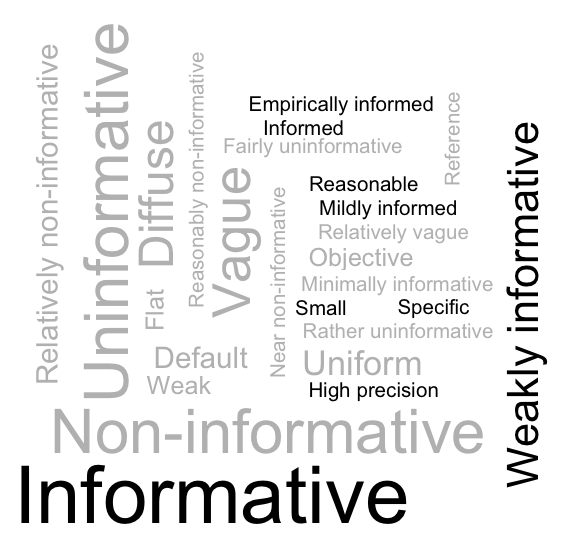Searching for Bayesian Systematic Reviews
Bayesian analyses are becoming ever more popular in many different disciplines as is indicated by the Bayesian systematic reviews listed below. For a new paper I am searching for even more systematic review papers describing this increase. Will you help me??
Bayesian systematic reviews in the fields of:
- Bayesian Model Averaging (Fragoso et al., 2017)
- Clinicians’ beliefs about treatment effectiveness (Johnson et al., 2010)
- Education (Köning & van de Schoot, 2017),
- Epidemiology (Rietbergen, Debray, Klugkist, Janssen, & Moons, 2017),
- Health technology (Spiegelhalter, Myles, Jones, & Abrams, 2000),
- Medicine (Ashby, 2006),
- Mixed treatment comparisons (Sobieraj et al., 2013)
- Organizational science (Kruschke, 2010),
- Psychometrics (Rupp, Dey, & Zumbo, 2004),
- Psychotraumatology (Van de Schoot, Schalken, & Olff, 2017)
- Psychology (Van de Schoot, Winter, Ryan, Zondervan-Zwijnenburg, & Depaoli, 2017).
- Statistics (Smid, McNeish, Miočević, & van de Schoot, 2019)
The Wordcloud shows the terms used to describe the level of informativeness of the priors in the empirical regression-based papers found in our review in the field of Psychology.
If you want to start your own systematic search, you might be interested in using our ASReview tool using Active Learning (a specific form of Machine Learning) and safe hundreds of hours time screening abstracts.
References:
Ashby, D. (2006). Bayesian statistics in medicine: a 25 year review. Statistics in Medicine, 25(21), 3589-3631. https://doi.org/10.1002/sim.2672
König, C., & van de Schoot, R. (2017). Bayesian statistics in educational research: a look at the current state of affairs. Educational Review, 1-24. Doi: https://doi.org/10.1080/00131911.2017.1350636
Kruschke, J. K. (2010). Bayesian data analysis. Wiley Interdisciplinary Reviews: Cognitive Science, 1(5), 658-676. http://dx.doi.org/10.1002/wcs.72
Rietbergen, C., Debray, T. P., Klugkist, I., Janssen, K. J., & Moons, K. G. (2017). Reporting of Bayesian analysis in epidemiologic research should become more transparent. Journal of Clinical Epidemiology, 86, 51-58. https://doi.org/10.1016/j.jclinepi.2017.04.008
Rupp, A. A., Dey, D. K., & Zumbo, B. D. (2004). To Bayes or not to Bayes, from whether to when: Applications of Bayesian methodology to modeling. Structural Equation Modeling, 11(3), 424-451. http://dx.doi.org/10.1207/s15328007sem1103_7
Smid, S. C., McNeish, D., Miočević, M., & van de Schoot, R. (2020). Bayesian versus frequentist estimation for structural equation models in small sample contexts: A systematic review. Structural Equation Modeling: A Multidisciplinary Journal, 27(1), 131-161. https://doi.org/10.1080/10705511.2019.1577140
Spiegelhalter, D. J., Myles, J., Jones, D., & Abrams, K. (2000). Bayesian methods in health technology assessment: a review. Health Technology Assessment, 4(38), 130. http://dx.doi.org/10.3310/hta4380
van de Schoot, R., Schalken, N., & Olff,. M. (2017). Systematic search of Bayesian statistics in the field of Psychotraumatology. European Journal of Psychotraumatology, 8(Suppl 1), 1–6. https://doi.org/10.1080/20008198.2017.1375339
van de Schoot, R., Winter, S. D., Ryan, O., Zondervan-Zwijnenburg, M., & Depaoli, S. (2017). A systematic review of Bayesian articles in psychology: The last 25 years. Psychological Methods, 22(2), 217-239. http://dx.doi.org/10.1037/met0000100



the kass & raftery 1995 paper on Bayes factors is a good one, maybe similar in spirit to the Fragoso paper you already have.